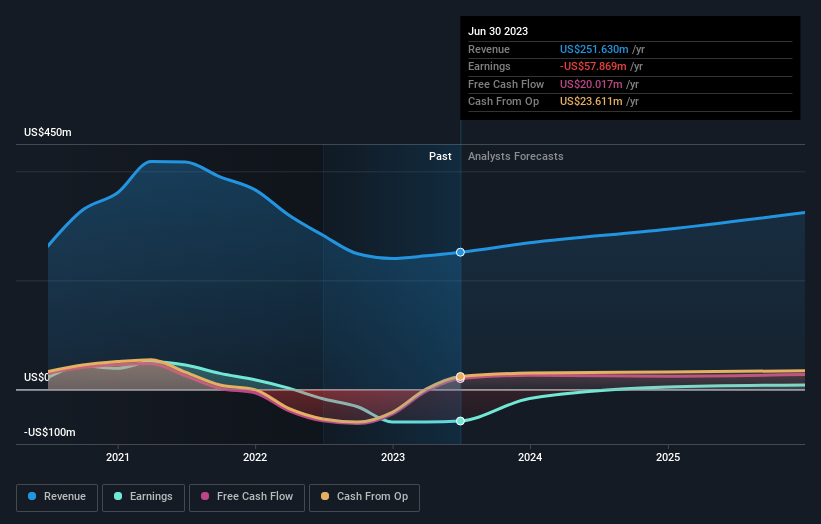Analysts Have Made A Financial Statement On Turtle Beach Corporation's (NASDAQ:HEAR) Second-Quarter Report
As you might know, Turtle Beach Corporation (NASDAQ:HEAR) last week released its latest quarterly, and things did not turn out so great for shareholders. Revenues missed expectations somewhat, coming in at US$48m, but statutory earnings fell catastrophically short, with a loss of US$0.93 some 150% larger than what the analysts had predicted. This is an important time for investors, as they can track a company's performance in its report, look at what experts are forecasting for next year, and see if there has been any change to expectations for the business. We've gathered the most recent statutory forecasts to see whether the analysts have changed their earnings models, following these results.
See our latest analysis for Turtle Beach
After the latest results, the six analysts covering Turtle Beach are now predicting revenues of US$268.9m in 2023. If met, this would reflect an okay 6.8% improvement in revenue compared to the last 12 months. Losses are predicted to fall substantially, shrinking 71% to US$0.97. Before this latest report, the consensus had been expecting revenues of US$270.3m and US$0.54 per share in losses. While this year's revenue estimates held steady, there was also a considerable increase to loss per share expectations, suggesting the consensus has a bit of a mixed view on the stock.
The consensus price target held steady at US$15.00, seemingly implying that the higher forecast losses are not expected to have a long term impact on the company's valuation. The consensus price target is just an average of individual analyst targets, so - it could be handy to see how wide the range of underlying estimates is. There are some variant perceptions on Turtle Beach, with the most bullish analyst valuing it at US$17.00 and the most bearish at US$14.00 per share. This is a very narrow spread of estimates, implying either that Turtle Beach is an easy company to value, or - more likely - the analysts are relying heavily on some key assumptions.
Taking a look at the bigger picture now, one of the ways we can understand these forecasts is to see how they compare to both past performance and industry growth estimates. The analysts are definitely expecting Turtle Beach's growth to accelerate, with the forecast 14% annualised growth to the end of 2023 ranking favourably alongside historical growth of 2.5% per annum over the past five years. By contrast, our data suggests that other companies (with analyst coverage) in a similar industry are forecast to grow their revenue at 6.3% per year. Factoring in the forecast acceleration in revenue, it's pretty clear that Turtle Beach is expected to grow much faster than its industry.
The Bottom Line
The most important thing to note is the forecast of increased losses next year, suggesting all may not be well at Turtle Beach. Fortunately, they also reconfirmed their revenue numbers, suggesting that it's tracking in line with expectations. Additionally, our data suggests that revenue is expected to grow faster than the wider industry. There was no real change to the consensus price target, suggesting that the intrinsic value of the business has not undergone any major changes with the latest estimates.
Keeping that in mind, we still think that the longer term trajectory of the business is much more important for investors to consider. At Simply Wall St, we have a full range of analyst estimates for Turtle Beach going out to 2025, and you can see them free on our platform here..
It is also worth noting that we have found 2 warning signs for Turtle Beach that you need to take into consideration.
Have feedback on this article? Concerned about the content? Get in touch with us directly. Alternatively, email editorial-team (at) simplywallst.com.
This article by Simply Wall St is general in nature. We provide commentary based on historical data and analyst forecasts only using an unbiased methodology and our articles are not intended to be financial advice. It does not constitute a recommendation to buy or sell any stock, and does not take account of your objectives, or your financial situation. We aim to bring you long-term focused analysis driven by fundamental data. Note that our analysis may not factor in the latest price-sensitive company announcements or qualitative material. Simply Wall St has no position in any stocks mentioned.

